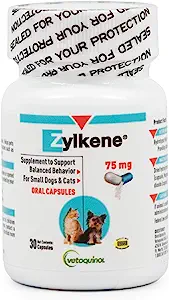Why is my cat itchy?
Every cat gets itchy sometimes. but some cats have excessive itching on their backs and other parts of their body. But what causes the feeling of an itch?
It starts somewhere at an end of a nerve in the skin of the back. At that point, something is happening in the skin that stimulates certain nerves related to itch perception. That nerve therefore receives a stimulus from the tissue that has a “problem”. For example, an irritating substance or an inflammation, etc.
The itching stimulus is then transmitted via the nerves to the nerves in your cat’s spinal cord. There they are transferred to other nerves that then run to your cat’s brain. The itching stimulus is released and processed in the brain. This happens in special brain areas that are involved in the processing of itch, such as the “thalamus” and the “somatosensory cortex”. You can immediately forget those words, way too difficult! But those parts assess the severity of the itching and determine what an appropriate response your cat may have to the itch on its back to resolve that itch.
What does a cat do if it itches?
To solve the itching on his back, a cat can do several things. He can ignore it, if it’s not too bad. But usually your cat will decide to scratch, bite or lick that spot. They also like to rub against objects in the house to relieve the itch on their back. And if they itch for a long time, your cat with an itch on its back can also become quite grumpy. Just imagine that you are sleeping soundly, but you keep waking up because you are so itchy. It does not benefit your night’s sleep.
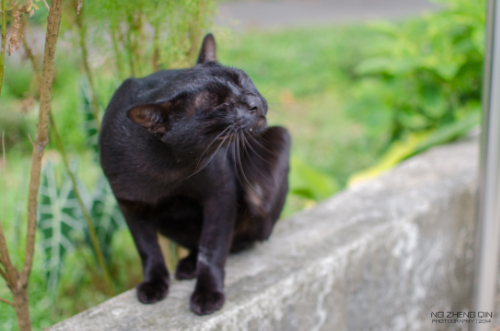
What causes the itch on your cat's back?
There are actually too many possible causes of itching on your cat’s back to list. Still, we make an attempt.
- Fleas: Flea bites are a common cause of an itch on your cat’s back.
- Allergies: Cats can be allergic to food, pollen, dust mites, or other environmental allergens.
- Skin conditions: Various skin conditions such as skin inflammation or eczema can cause an itch on the back.
- Parasitic infections: Parasites other than fleas, such as mites or lice, can irritate the cat’s skin and cause an itch.
- Flea allergic dermatitis: Some cats are particularly sensitive to flea bites and develop an allergic reaction that leads to severe itching, especially on the back near the base of the tail.
- Food allergies: An allergy to certain ingredients in cat food can cause skin problems and an itch.
- Stress or behavioral problems: Excessive licking or biting of the back can sometimes be an expression of stress or behaviour problems in cats.
- Contact allergies: Cats can have an allergic reaction to certain substances they come into contact with, causing an itch on their back.
- Autoimmune diseases: Your cat’s immune system attacks its own skin.
Cat has an itch on his back due to fleas
Fleas are small, bouncy, black insects that mainly live in your cat’s environment. So not on your cat itself. The majority of fleas live in their blanket or in cracks of the floor and behind your baseboards. Only a small proportion of fleas live on your cat. They only use your cat to suck blood when they want to reproduce. But the fleas that do live on your cat jump there and walk there, which causes an itch. And then they bite him. So even more itching. And to reduce that itch, your cat will wash and bite itself excessively.
Cat has an itch on his back due to a flea allergy
In the previous case, it is mainly the movement and biting that causes the itching on your cat’s back. But with a flea allergy, your cat has an allergic reaction to the saliva that the flea bites into your cat’s skin. Very characteristic of a flea allergy is that your cat usually licks and bites mainly its lower back (bald). So the part of its back that is just in front of the tail. The itching is so bad that your cat usually has small scabs on his lower back. We also call this miliary dermatitis.
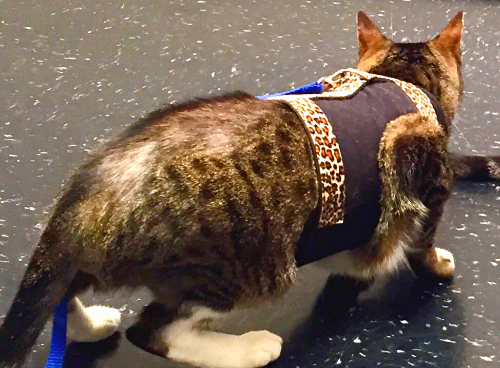
Cat has an itch on his back due to mites
Mites that live on your cat’s back and cause an itch are mainly the Sarcoptes mites. There are several mites that live on cats, such as the fur mite (Cheytetiella mite) or the hair follicle mite (Demodex mite), but they hardly cause itching. The Sarcoptes mite lives in the skin and digs tunnels in there. This results in itching. If it continues long enough, baldness and crusty pads will also occur.
Cat has an itch on his back due to an allergy
We previously discussed flea allergies. But there is also a food allergy, an atopic allergy or a contact allergy. We explain them one by one below.
Cat has an itch on his back due to food
If a cat has an itch on his back as a result of a food allergy, this means that he can not tolerate certain substances in his food. This can be any substance, but most of the times it is due to a certain protein source or carbohydrate source. As a protein source we mean, for example, beef proteins or lamb proteins. And as a carbohydrate source we mean wheat, rice, potato, etc. As a result of the allergic reaction in your cat’s body, skin infections occur. This can occur anywhere on your cat’s body, but in this article we are talking about an itch on your cat’s back. To resolve the itch, it is necessary to remove the nutrient he is allergic to from his diet. But hey, how do you find out what that is? We will give you more information about that later in this article.
Cat has an itch on his back due to environmental substances
If your cat reacts to substances in the air such as tree pollen or grass pollen, we call this an atopy or atopic allergy. He inhales these substances, which enter his bloodstream and then his immune system becomes overly active and causes an itch and skin infections. In this case too, we talk about itching on your cat’s back, but in fact your cat can also experience itching on other parts of the body. Here too, the allergic reaction will be resolved as soon as the substances to which your cat is allergic disappear from the air. But ofcourse, removing tree pollen or grass pollen from the air is not that easy. We will also give you more information about this allergy later in the article.
Cat has an itch on his back due to physical contact with certain substances
A contact allergy is slightly less common in cats. When it comes to itching on your cat’s back, the source of the allergy is something that he touches a big part of the day with its back. For example, his pillow or blanket, detergents you wash their stuf with or cleaning products. Sofas are also sometimes impregnated with substances to which your cat can have an allergic reaction.
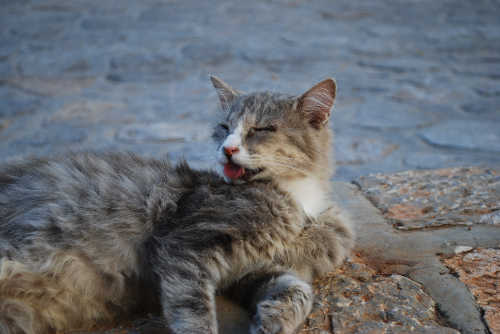
Cat has an itch with hair loss and bald spots
If your cat is very itchy, he is probably biting and licking his back a lot. As a result, it can bite trough or break hairs, resulting in bald spots. You may confuse this with hair loss. But there are also certainly some infections of the skin, which destroy the hair follicles and cause the hair to no longer remain attached and can no longer be regenerated. We have created a separate page about bald spots on your cat’s back where you can read more information about this.
Cat has an itch due to stress
It is actually not well known whether a cat with stress is more itchy than a relaxed cat. Itching itself also causes stress. But there are cats that are sensitive to stress. To lower the stress, they groom themselves. This behaviour calms them down. But if they feel a lot of stress in their body, they will also groom themselves a lot. And people can confuse this with itching. But again, it is actually not entirely certain whether these cats have an itch or not. It is known that if the source of their stress is removed, excessive washing also stops.
Cat has an itch after a flea treatment
In this case several things are possible. For example, if you have used a pipette in their neck, the liquid will spread over their body. Many cats don’t like that sticky substance. They will try to remove it from their body by scratching and rubbing against objects. So this seems to be a bit itchy.
But they can also have a form of contact allergy to a flea product. The medicine you gave them comes into contact with their skin and can cause an allergic reaction. In that case, the itching is quite intense and lasts for a few weeks. This is in contrast to the itching of putting on the pipette, which only lasts a day or 2.
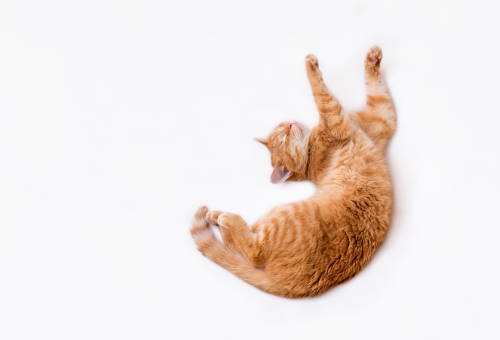
How to remove an itch in cats
Remove the source of the itch
It goes without saying that if you know what has caused your cat to itch, you should remove it. But in most cases you don’t know that. In this case, it is wise to take the following steps.
Treating mites and fleas
In the vast majority of cases, the itching occurs as a result of fleas, flea allergy or a mite problem. It is therefore wise to start with a product that will kill all these itchy creatures. For example, Stronghold, Bravecto, Advocate etc. all work against mites and fleas. Unfortunately, you can only get these remedies from a vet. You can buy this at the counter without a consultation.
Reduce stress in your cat
If you think your cat is a stress-sensitive type, you can counteract the stress by giving Zylkène tablets. It contains substances that increase serotonin in the brain and make your cat feel more confident and relaxed. After a week or two you should see a (clear) difference in your cat and his licking behaviour on its back.
Treat a contact allergy
Of course, you don’t know whether this is the cause of your cat’s back itching. It is therefore best to ensure that your cat lies on various objects as little as possible. It is best to use an old towel that you have washed many times and which you are now going to wash without detergent. Try to convince your cat to only sleep on that towel. But yes, we are also aware of the stubborn character of cats. Does he prefer to lie on bare surfaces? Then only wipe it with a clean cloth that contains only water and no cleaning agents. This way, the chance of problems from a contact allergy is very small.
Home remedy for an itch in cats on a natural basis
Before we embark on the long journey of a food allergy, you can try to see whether your cat would benefit from products that strengthen skin resistance. In this way, mild skin infections are prevented and the source of the itching is removed. A good example for a product that does that is Allerderm Omegaderm. It contains essential fatty acids that strengthens your cat’s skin and gives your cat a better chance to get rid of the itch on his back.
Home remedy for an itch in cats on a medical basis
If you want a stronger treatment for the itch and are okey with a less healthy medical treatment you best use hydrocortisone. This stops the inflammation of the skin and slows down the immune response that is over active in case of an allergy. It is not ment to give this medicin to your cat for the rest of his life. But it is okey to give it to him for 3 weeks so his skin can heal and hopefully becomes strong enough to resist new itch-attacks. You best use the Allerderm Omegaderm for the rest of his life combined with the hydrocortiderm spray for three weeks.
Take a food allergy test
What nutrition should you give?
If you have tried all the above options and it has not helped the itching on your cat’s back? Then it’s time to take a food allergy test. You can perform this test yourself, without the intervention of your veterinarian.
It is important to give your cat food that does not contain the substance he is allergic to. But of course, you don’t know which substance that is. So it is best to use Royal Canin Ultamino for this test. This food has proteins that have been made so small that they can be used as a building block for the body, but an allergic reaction is not possible. The substances do not fit the immune cells, so to speak. The carbohydrate source is also treated in this way. An allergic reaction to the food is therefore no longer possible. That is why this food is most suitable for taking the test.
Later, when you are sure whether his itching is caused by a food allergy, you can try whether other (cheaper) foods also work for him. But you first want to know whether or not it is due to the diet.
How does the food allergy test work?
Now comes the hard part! You have to have patience. Your cat should not eat anything other than this food for the next 8 weeks. So no treats on the side or anything from your refrigerator. Resist those pleading eyes! And you probably won’t see any results for the next 4 weeks. This is because the old proteins that caused his allergy (if it is a food allergy) are incorporated in his body. It takes about 3 weeks before they are replaced with the new building materials. So only around the 4th week you will start to see that the itching decreases if there is a food allergy. Did nothing change after 8 weeks and have you really not given him anything else besides his new kibble? Then unfortunately there is no food allergy and you can, if you wish, switch back to his old diet.
Does it have any effect? Super nice! Then your cat can keep this food for the rest of its life. But it is a somewhat more expensive food and not everyone can afford it. In that case you can now test cheaper hypoallergenic kibble. If he gets itchy again, switch back to the Anallergenic. In any case, use a different animal species and a different carbohydrate source in the kibble each time you switch. In addition, I would use natural foods as much as possible and to have as few preservatives in the food as possible.
The itching on your cat's back has not disappeared yet, now what?
Have you performed all the above mentioned steps and it didn’t work? Then there is probably an atopic allergy (or an autoimmune disease, but that is quite rare). However, these are not problems that you can solve yourself. So it is best to take your cat to your vet. They will probably either do an allergy blood test first or prescribe oral anti-itch medication.
However, you can also buy an allergy test for an atopy online. Unfortunately, we have no experience with it and therefore do not know whether it works or not.
Good luck!
Hopefully you have gotten enough tips ands tricks to get your cat free of an itch on his back. We wish you and your cat all the luck you need.

